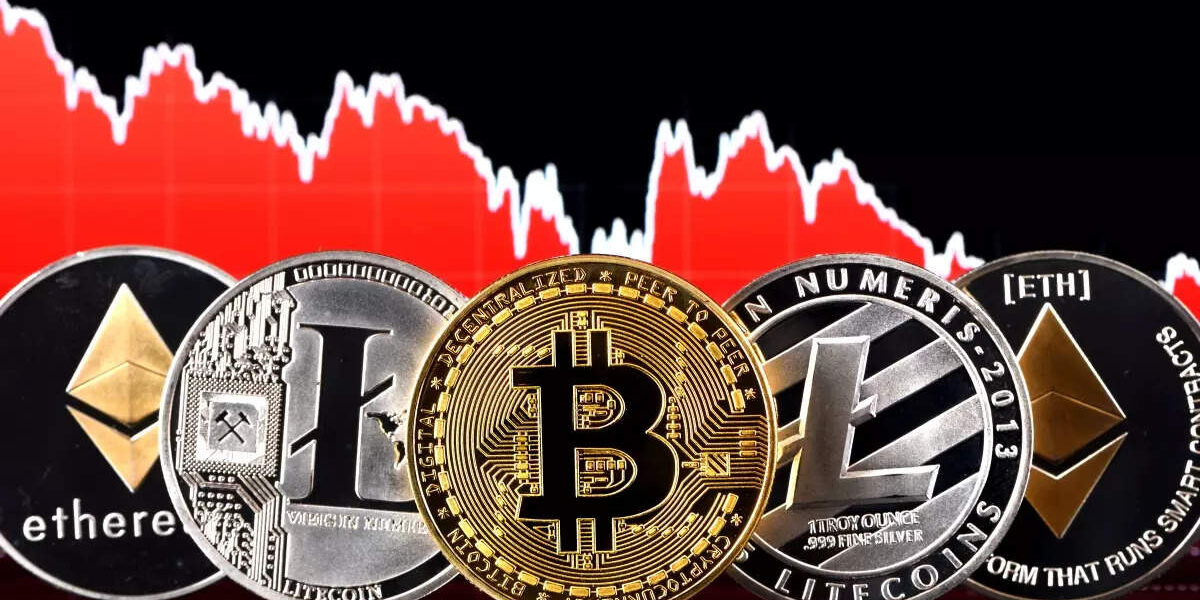
An attempt to regulate the unregulated currency
The cryptocurrency market is dynamic, and its popularity has been rising, possibly because the system is decentralised, and it is relatively easier to make international payments instantly. However, one cannot ignore that cryptocurrency is speculative and volatile in nature, not universally accepted as a method of exchange, brings along environmental concerns as it requires a lot of electricity, and most importantly, there is lack of policing and regulation. It is possibly due to these drawbacks and cryptocurrency’s unorthodox approach that the Indian government has been playing hide and seek with the concept of cryptocurrency in India, although it cannot be ignored that India has undergone significant changes in this field.
INTRODUCTION
As trade and economy has developed over the years, humans have invented different systems of exchange. When society was at its early stages, it started with the barter system, which was a cashless system of exchanging services or goods, without regulations by any authority. This system gradually ended and led to the circulation of coins made of precious metals such as gold and silver. As banks were established and governments increased control, the system realised that as long as there was trust in the society, there was no need to use precious metals and people hence instead started exchanging paper money. Thereafter, e-commerce through digital payments such as credit and debit cards, online banking and other application based financial services became an easier mode for transactions. Hence, in a way, e-commerce reintroduced the possibility of a cashless system, albeit under the supervision of a monetary authority. The world has taken full circle and is now attempting to transition into what looks like a virtual version of the barter system, i.e., a cashless economy sans regulations by any monetary authority. However, instead of exchanging horses for cats or milk for eggs, a digital currency, i.e. ‘cryptocurrency’ works as a medium of exchange through the computer. There are key differences between the currency issued by the Reserve Bank of India (RBI), which is India’s central bank and regulatory body, and cryptocurrency. The former is physical and the RBI determines the value of the fiat currency, whereas the latter is a digital currency drawing its value from market forces of supply and demand and does not hold the value of legal tender. This paper seeks to analyse the regulatory set up regarding cryptocurrency in India and further discusses whether the approach taken by India is suitable.
HOW IS INDIA REGULATING CRYPTOCURRENCY?
The legal status of cryptocurrency varies from one country to the other and the changes are still ongoing in many countries.[1] Many countries have accepted transactions in cryptocurrency. For instance, Financial Crimes Enforcement Network (FinCEN) of the U.S. Department of Treasury has been issuing guidance on Bitcoin since 2013, and the Treasury has defined Bitcoin as a convertible currency with an equivalent value in real currency or one that can act as a substitute for real currency.[2] Canada[3] and Australia[4] view Bitcoin as a commodity that can be taxed. El Salvador went to the extent of declaring Bitcoin a legal tender.[5] Belarus also welcomed cryptocurrency by recognising crypto-mining, exchange services and smart contracts as legitimate services and even authorised Initial Coin Offering (ICO) at the national level by introducing the “Digital Economy Development Ordinance”.[6] Venezuela launched its own cryptocurrency pegged to oil, called “Petro”.[7] However, some other jurisdictions have not responded to cryptocurrency this positively. For instance, a complete ban on cryptocurrency trading and mining was put into effect in China on 24 September 2021.[8] Other countries such as Algeria,[9]Bolivia,[10] Bangladesh[11] and Nepal[12] have also placed bans on cryptocurrency. The primary Islamic legislator in Egypt has even issued a religious decree prohibiting commercial transactions in Bitcoin.[13] India is yet to take a firm stance on the operation of cryptocurrency in India, and has not taken either of the extreme sides, as can be seen from the following regulatory stages:
- Reserve Bank of India’s reservations on virtual currencies
On 24 December 2013, the RBI issued a circular cautioning the users, holders and traders of virtual currencies about the potential financial, operational, legal, consumer-related and security-related risks. [14] The circular stated that creation, trading or usage of virtual coins as medium of payment are not authorised by any central bank or monetary authority and highlighted several risks such as susceptibility of digital wallets due to hacking, loss of password, compromise of access credentials, malware attacks etc; lack of a centralised agency which regulates such payments and an established framework for recourse to customer problems, disputes, charge bank etc; high volatility in the value of virtual currencies; unclear legal status of exchange platforms set up in various jurisdictions; and anonymity leading to unintentional breach of anti-money laundering and combating financing of terrorism laws.
Thereafter, on 01 February 2017, the RBI issued another circular advising that it had not given any license or authorisation to any entity or company to operate schemes or deal with virtual currency and anyone doing so, would do it at their own risk.[15] The RBI reiterated its concerns conveyed in the above-mentioned notices on 05 December 2017, due to significant spurt in the valuation of many virtual currencies and rapid growth in ICOs.[16] The RBI issued a statement dated 05 April 2018 (“RBI statement dated 05.04.2018”) which mentioned that technological innovations, including those underlying virtual currencies, have the potential to improve the efficiency and inclusiveness of the financial system, however, virtual currencies raise concerns of consumer protection, market integrity and money laundering among others.[17] Subsequently, possibly because the warnings in the above-mentioned circulars did not create the deterrent effect that the RBI was expecting, it issued another circular on 06 April 2018 (“RBI Circular dated 06.04.2018”), stopping entities regulated by the RBI from dealing in virtual currencies or providing services for facilitating any person or entity in dealing with or settling virtual currencies. [18] The RBI listed such services as including maintaining accounts, registering, trading, settling, clearing, giving loans against virtual tokens, accepting them as collateral, opening accounts of exchanges dealing with them and transfer / receipt of money in accounts relating to purchase/ sale of virtual currencies. It was further provided that regulated entities which already provided such services shall exit the relationship within three months from the date of this circular, i.e. 06 April 2018.
However, despite these circulars by the RBI, banks continued to allow transactions on cryptocurrency exchanges perhaps because of the internal verification system in the blockchain technology. It is often argued that since the blockchain technology runs around multiple computers globally and enforces a distributed ledger, any change in the ledger will be noticeable and hence hacking is close to impossible. Another layer of security is cryptography, which allows only the sender and recipient of the message to view its contents. In other words, each block has a unique key and if there is a change in data, this unique key becomes invalid, thereby discarding the block from the chain. This makes it very difficult for a third party to interfere with the transaction.
- Several committees constituted to clarify the framework and provide suggestions regarding cryptocurrency
The Ministry of Finance constituted an Inter-Disciplinary Committee on 12 April 2017 to examine regulatory and legal structure as well as status of virtual currencies in India and globally, and suggest measures for dealing with virtual currencies.[19] The report of the said Committee was submitted on 25 July 2017, wherein inter alia, it recommended that a very visible and clear warning should be issued through public media which should inform the public that government does not consider cryptocurrency as either coins or currencies and also advise that offering to buy or sell these currencies, or offering a platform to exchange these currencies should stop. Further, all consumer protection and enforcement agencies were advised to take action against people who continued indulging in these activities. People who had bought these currencies in good faith were advised to offload these in a jurisdiction where it was not illegal to do so.[20]
The RBI also set up an Inter-Regulatory Working Group on Financial technology (Fintech) and Digital Banking to look into aspects relating to FinTech and its implications for the financial sector to reorient the regulatory framework and respond to rapid changes.[21] The said working group submitted its report in November 2017, which stated that India is a conservative market where cash is still the dominant mode of transaction and usage of digital financial currency such as ‘bitcoin’ has not seen much traction when compared to international markets.[22] Thereafter, in March 2018, the Central Board of Digital Tax submitted a draft scheme to the Department of Economic Affairs for banning virtual currencies in a step-by-step manner as many people had already invested in cryptocurrencies. The said scheme also suggested that legislative amendments must be carried out before banning them.[23]
The government constituted an Inter-Ministerial Committee on 02 November 2017, to examine the issues related to virtual currencies and propose specific actions to be taken.[24] The Inter-Ministerial Committee initially found a complete ban on virtual currency extreme and suggested that the same objectives can be achieved through regulatory measures. The Committee recommended the ‘Crypto Token and Crypto Asset (Banning, Control and Regulation) Bill of 2018’ which proposed to (i) prohibit persons dealing with activities related to crypto tokens from falsely posing these products as not being securities or investment schemes or offering investment schemes due to gaps in the existing regulatory framework and (ii) regulate VC exchanges and brokers where sale and purchase may be permitted. The fate of this bill is still unclear. [25] The Inter-Ministerial Committee released its report on 28 February 2019, wherein it proposed the government to keep an open mind on official digital currency and recommended banning of cryptocurrencies in India given the risks associated with private cryptocurrencies. The Inter-Ministerial Committee also proposed a legislation called ‘Banning of Cryptocurrency and [26]Regulation of Official Digital Currency Bill’ in February 2019, which sought to impose a complete ban on all crypto-related activities including mining, buying, holding, selling and dealing and made indulging in these activities an offence punishable with fine or imprisonment of up to 10 years or both. Particularly, the use of cryptocurrency: (i) as a medium of exchange, store of value or unit of account; (ii) as a payment system; (iii) for providing cryptocurrency related services to customers/investors such as registering, trading, selling or clearing; (iv) for trading with Indian currency or foreign currencies; (v) for issuing cryptocurrency related financial products; (vi) as a basis of credit; (vii) as a means of raising funds; and (viii) as a means for investment; was proposed to be prohibited. [27] The said bill further contemplated the creation of digital rupee as legal tender by the central government in consultation with RBI as well as the recognition of any official foreign digital currency, as foreign currency in India.[28] However, much to the delight of people experimenting with cryptocurrencies, the bill never materialised into law.
Hence, the government has constituted several committees to study a possible framework for cryptocurrency in India, along with any issues that may arise, thereby indicating that India’s final stance on cryptocurrency will be an informed one due to the analysis of experts in this field on different aspects.
- Supreme Court’s check, but still no checkmate in favour of cryptocurrency.
After the Inter-Ministerial Committee was constituted in November 2017, writ petition numbered W.P. (C) No. 1071 of 2017 was filed seeking to declare all virtual currencies illegal and ban them as well as all websites and mobile applications which facilitate the dealing in virtual currencies. Another writ petition numbered W.P.(C) No. 1076 of 2017 was filed seeking a direction from the court to regulate the flow of crypto-money and to constitute a committee of experts to consider the regulation of cryptocurrencies. In addition to these writ petitions, a few companies running online crypto assets exchange platforms, with their shareholders or founders and a few individual crypto asset traders came up with another writ petition numbered W.P.(C) No. 373 of 2018, challenging the RBI statement dated 05.04.2018, as well as RBI Circular dated 06.04.2018. All these writ petitions were tagged along with each other, and came up for hearing on 11 May 2018, when it was pointed out that a few High Courts are also dealing with writ petitions concerning cryptocurrencies. A direction was issued on 17 May 2018, that no High Court shall entertain any writ petition relating to RBI Circular dated 06.04.2018. Thereafter, Internet and Mobile Association of India came up with W.P.(C) No. 528 of 2018. All these writ petitions together came up for hearing on 25 October 2018, when the Court was informed that the government had already constituted the Inter-Ministerial Committee which was at that time deliberating on the issue. The writ petitions were then adjourned till the Inter-Ministerial Committee came with their recommendations. After the Inter-Ministerial Committee submitted its bills as well as its report, a full bench of the Supreme Court in Internet and Mobile Association of India v. Reserve Bank of India[29] struck aside the RBI circular dated 06.04.2018. In its detailed judgment dated 04 March 2020, the Supreme Court examined the powers of RBI to issue RBI circular dated 06.04.2018 and whether such power was exercised proportionately.
- Powers of RBI to issue RBI circular dated 06 April 2018
The Supreme Court analysed the Reserve Bank of India Act, 1934,[30] the Banking Regulation Act, 1949,[31] and the Payment and Settlement Systems Act, 2007[32] and opined that these Acts cumulatively recognise and give very wide powers to RBI. The RBI has statutory obligation of operating the currency and credit system, regulating the financial system and ensuring the payment system of the country to be on track. These wide powers would compel the RBI to address all issues that are perceived as potential risks to the monetary, currency, payment, credit and financial systems of the country. Hence, the RBI can deal with an intangible property which can act as money under certain circumstances. The Supreme Court acknowledged that the RBI circular dated 06.04.2018 has caused collateral damage to some establishments who do not come within the reach of RBI’s net, like the petitioners in Internet and Mobile Association of India v. Reserve Bank of India.[33] The Supreme Court however stated that the RBI circular dated 06.04.2018 is addressed to only those entities which are regulated by RBI with an intention to prohibit banking companies from entering certain territories, and in any case, there was no ground to hold that it amounts to total prohibition.
- RBI circular dated 06 April 2018 and proportionality
The Supreme Court opined that even though the RBI has wide powers, the availability of powers is different from the manner and extent to which they can be exercised. It was held that the RBI circular dated 06.04.2018 was not proportionate as the RBI could not successfully show that the entities regulated by RBI suffered any loss or adverse effect directly or indirectly on account of exchange of virtual currencies. Further, RBI’s stand consistently is that they have not banned virtual currencies and even the government is unable to decide on the matter, despite proposals of several committees and bills. The Supreme Court also noted that such restrictions would interfere with the fundamental right of citizens to carry practice any profession, or to carry on any occupation, trade or business which is granted under Article 19(1)(g) of the Indian Constitution.
While the judgment of the Supreme Court dealt with various nuances relating to virtual currencies and set aside the RBI circular dated 06.04.2018, it did not expressly approve transactions involving cryptocurrencies. This is perhaps because the Court was not required to create a regulatory framework within the conspectus of the issues raised in the matter. Given the inconsistent views of the legislature and government on virtual currencies, it may be unfair to put that burden solely on the judiciary. However, the Supreme Court did provide some clarity by not explicitly banning cryptocurrencies, which came to the aid of Ld. Metropolitan Magistrate, Tis Hazari Court, while dealing with a case regarding purported fraud committed in the sale and purchase of Bitcoins in India, namely Hitesh Bhatia v. Kumar Vivekananda[34]. The Court after relying on Internet and Mobile Association of India v. Reserve Bank of India,[35] inter alia observed that:
(i) transactions in cryptocurrency have to comply with the general law in force in India including Prevention of Money Laundering Act, 2002, Indian Penal Code, 1860, Foreign Exchange Management Act, 1999, the tax laws, and with the RBI regulations mandating know your customer, Combating of Funding of Terrorism (“CFT”) and Anti-money Laundering Requirements (“AML”);
(ii) KYC is the responsibility of the intermediary, which in turn cannot shy away from the responsibility of ensuring legitimacy of the source and destination of money, and establishment of the real identity of the parties; and
(iii) Even in the absence of any specific law regulating or banning, or monopolising cryptocurrency, only legitimate trade in the same, through legitimate intermediaries may aspire for protection under Article 19 (i)(g) of the Constitution of India.
There are several other ongoing litigations involving allegations relating to cheating of cryptocurrency,[36] and a consistent stand taken by courts regarding cryptocurrency may be helpful in disposing of such litigations, along with any other litigations that may arise in future on similar issues.
- Recent attempts by the government to regulate cryptocurrency in India
On 24 March 2021, the Ministry of Corporate Affairs released a notification mandating companies to inter alia make disclosures pertaining to profit earned/loss incurred on transactions involving virtual and crypto currencies undertaken by them during a financial year; the amount of virtual and crypto currencies held on reporting date; and deposits or advances received by companies from any person for trading or investing in virtual or cryptocurrencies.[37]
The benefit of cryptocurrency was highlighted in the Draft National Strategy on Blockchain, 2021, published by the Ministry of Electronics and Information Technology,[38] which said that blockchain technology provides transparency, security and efficiency in business operations and enables a layer of trust over Internet in a unique way, which was first tried for cryptocurrency application, Bitcoin. [39]
Thereafter, the Cryptocurrency and Regulation of Official Digital Currency Bill, 2021 was listed in the Parliament several times but the introduction of the bill was deferred. While there was anticipation regarding some discussions revolving around cryptocurrencies in the budget session held in February 2022, it was not tabled even then. The said bill seeks to create a facilitative framework for creation of official digital currency to be issued by the RBI and to prohibit all private cryptocurrencies in India, with certain exceptions to promote the technology of cryptocurrencies.[40]
The Indian population has shown significant interest in virtual currencies and a complete ban on private cryptocurrencies will naturally have its consequences. The RBI has consistently shown its concern over possible misuse of virtual currencies for criminal activities and banning private cryptocurrencies may lead to black-marketing. Further, even the introduction of a national digital currency may not substantially mitigate the risk as it will perform the same functions as other cryptocurrency. Some other concerns that arise around this bill relate to transactions of foreign investors as while such foreign investors may transact in the Indian digital currency, the freedom of Indian investors to invest in foreign currencies is curbed by this bill which may lead to further complications. It is also uncertain whether foreign investors will be allowed to invest in the Indian digital currency and how it will be regulated.
- Budget 2022-23
Even though the Cryptocurrency and Regulation of Official Digital Currency Bill, 2021 has not yet been debated during the Budget session, the Budget did bring some important changes in the cryptocurrency sector. For instance, the Finance Bill, 2022 which was introduced with the Budget proposed including the definition of virtual digital assets (VDAs) under the Income Tax Act, 1961.[41] VDAs have been broadly defined in the Finance Bill, 2022 to include any information, code, or number, thereby including all forms of cryptocurrencies.[42] Interestingly, the definition of VDAs seems to have drawn inspiration from the definition of ‘Cryptocurrency’ as was provided in the Banning of Cryptocurrency and Regulation of Official Digital Currency Bill, 2019.[43] The Budget also proposed that gains from VDAs or crypto assets would attract a tax of flat 30%, and that no deduction will be allowed on these gains. It also proposed that loss arising from sale of the virtual assets cannot set off against any other income. The gifting of crypto tokens and virtual assets would be taxed at the hands of the recipient. The Budget further proposed to provide for TDS on payment made relating to transfer of VDAs at 1 per cent of such consideration, above a monetary threshold.
The tax rates introduced by the government relating to earnings from cryptocurrencies are high which may have been done to deter trading in cryptocurrencies. The high tax rate seems as though the government sees trading in cryptocurrency as speculation and not investment. On the other hand, it may be argued that taxing cryptocurrency is a step closer to welcoming trading in cryptocurrency, rather than banning it.
CONCLUSION AND SUGGESTIONS
Cryptocurrency has gained significant global momentum. There are several instances that are testament to this fact. For instance, several billionaires and corporate giants have invested colossal amounts in cryptocurrency; Tesla’s Bitcoin investment is nearly $2 billion.[44] Uber’s CEO Dara Khosrowshahi also said that Uber might accept cryptocurrencies as a mode of payment at some point.[45] Uber is not the only company who has shown inclination in making cryptocurrency transactions. Microsoft, AT&T, Wikipedia and Tesla have already announced schemes relating to accepting cryptocurrency as payment in some way or the other.[46] This global momentum and the fact that many countries have legalised transactions in cryptocurrency,[47] makes it close to impossible to believe that cryptocurrency as a concept will ever be eradicated from this planet. On the other hand, many countries such as India have been concerned about the speculative nature of cryptocurrency, country’s financial stability as well as its potential to attract illegal activities due to it being decentralised. Some countries have even gone to the extent of banning cryptocurrency.[48] However, as was pointed out by the Supreme Court in Internet and Mobile Association of India v. Reserve Bank of India,[49] there must be data to justify the ban and demonstrate an actual need for it.
Technology has been on a rise and more advances in this sector are bound to take place. Therefore, the way forward may not be to completely ban cryptocurrency, but rather manage the risks associated with it by creating a well-regulated space. With the recent taxation strategy proposed in the Budget 2022-23, India seems to already be moving towards regulating the cryptocurrency atmosphere. Another step may be to revisit the ‘Crypto Token and Crypto Asset (Banning, Control and Regulation) Bill of 2018’,[50] which did not ban cryptocurrency and only allowed it subject to regulations. India may also solve the crypto-dilemma by observing the approach of other countries such as Australia,[51] and Japan[52] who have brought forth policies to regulate cryptocurrency in their jurisdictions.
Photo Source:
About the author
Shreya Singh graduated from National Law University, Jodhpur with B.A. LL.B. (Trade & Investment Law) Hons. in 2020. She was working with the Disputes Team at Trilegal and is currently a Law Clerk-cum-Research Assistant at the Supreme Court of India
References
-
See e.g., Regulation of Cryptocurrency Around the World: November 2021 Updates by the Law Library of Congress, available at https://tile.loc.gov/storage-services/service/ll/llglrd/2021687419/2021687419.pdf ↑
-
See, Guidance on Application of FinCEN’s Regulations to Persons Administering, Exchanging, or Using Virtual Currencies by Department of the Treasure, Financial Crimes Enforcement Network, available at https://www.fincen.gov/sites/default/files/shared/FIN-2013-G001.pdf ↑
-
See, Guide for Cryptocurrency Users and Tax Professionals by Canada Revenue Agency, available at https://www.canada.ca/en/revenue-agency/programs/about-canada-revenue-agency-cra/compliance/digital-currency/cryptocurrency-guide.html ↑
-
See, Transacting With Cryptocurrency by Australian Taxation Office available at https://www.ato.gov.au/general/gen/tax-treatment-of-crypto-currencies-in-australia—specifically-bitcoin/?anchor=Transactingwithcryptocurrency ↑
-
See, El Salvador Becomes First Nation to Make Bitcoin Legal Tender by The New York Times available at https://www.nytimes.com/2021/06/09/world/americas/salvador-bitcoin.html ↑
-
See, Belarus’ Digital Economy Development Ordinance comes into force by Official Website of the Republic of Belarus available at https://www.belarus.by/en/press-center/news/belarus-digital-economy-development-ordinance-comes-into-force_i_0000076762.html ↑
-
See, As Venezuela’s economy regresses, crypto fills the gaps, by Reuters available at https://www.reuters.com/technology/venezuelas-economy-regresses-crypto-fills-gaps-2021-06-22/ ↑
-
See, China’s top regulators ban crypto trading and mining, sending bitcoin tumbling, by Reuters available at https://www.reuters.com/world/china/china-central-bank-vows-crackdown-cryptocurrency-trading-2021-09-24/;
People’s Bank of China, Circular on Further Preventing and Disposing of Speculative Risks in Virtual Currency Trading available at https://perma.cc/DC7U-MSDF ↑
-
See, Bitcoin ban: These are the countries where crypto is restricted or illegal by Euronews, available at https://www.euronews.com/next/2022/01/11/bitcoin-ban-these-are-the-countries-where-crypto-is-restricted-or-illegal2; Law No. 17-11 of 1917 (27 December 2017) art. 117, Official Gazette No. 76 of 2017 (28 December 2017) available at https://www.joradp.dz/FTP/JO-ARABE/2017/A2017076.pdf ↑
-
See, Bitcoin ban: These are the countries where crypto is restricted or illegal by Euronews, available at https://www.euronews.com/next/2022/01/11/bitcoin-ban-these-are-the-countries-where-crypto-is-restricted-or-illegal2; Communicado 04/2017 by Banco Central de Bolivia available at https://www.bcb.gob.bo/webdocs/11_comunicados/04_2017_COMUNICADO_Uso_monedas.pdf ↑
-
See, National Blockchain Strategy: Bangladesh, by Information and Communication Technology Division, Government of the People’s Republic of Bangladesh available at https://bcc.portal.gov.bd/sites/default/files/files/bcc.portal.gov.bd/page/bdb0a706_e674_4a40_a8a8_7cfccf7e9d9b/2020-10-19-15-03-391a6d9d1eb062836b440256cee34935.pdf ↑
-
See, Is it Possible to Trade cryptocurrencies including Bitcoin in Nepal by Nepal Rastra Bank, available at https://www.nrb.org.np; Cryptocurrency banned by Nepali Times, available at https://www.nepalitimes.com/business/cryptocurrency-banned/ ↑
-
See, Egypt’s Grand Mufti endorses Bitcoin trading ban, available at https://www.bbc.com/news/world-middle-east-42541270; Religious Decree No. 4205, The Status of Transactions in Bitcoins and Other Cryptocurrencies Under Islamic Law, by Egypt’s Dar Al-Ifta, available at https://perma.cc/432D-NHE5 ↑
-
See, RBI cautions users of Virtual Currencies against Risks by Reserve Bank of India, available at https://www.rbi.org.in/Scripts/BS_PressReleaseDisplay.aspx?prid=30247 ↑
-
See, RBI cautions users of Virtual Currencies by Reserve Bank of India, available at https://www.rbi.org.in/Scripts/BS_PressReleaseDisplay.aspx?prid=39435 ↑
-
See, Reserve Bank cautions regarding risk of virtual currencies including Bitcoins by Reserve bank of India, available at https://www.rbi.org.in/commonman/English/Scripts/PressReleases.aspx?Id=2474 ↑
-
Statement on Developmental and Regulatory Policies by Reserve Bank of India, available at https://rbidocs.rbi.org.in/rdocs/PressRelease/PDFs/PR264270719E5CB28249D7BCE07C5B3196C904.PDF ↑
-
See, Prohibition on dealing in Virtual Currencies by Reserve Bank of India, available at https://www.rbi.org.in/Scripts/BS_CircularIndexDisplay.aspx?Id=11243#:~:text=Prohibition%20on%20dealing%20in%20Virtual%20Currencies%20(VCs)&text=In%20view%20of%20the%20associated,dealing%20with%20or%20settling%20VCs. ↑
-
See, Government constitutes an Inter-Disciplinary Committee chaired by Special Secretary (Economic Affairs) to examine the existing framework with regard to Virtual Currencies by Press Information Bureau, Government of India, available at https://pib.gov.in/newsite/printrelease.aspx?relid=160923 ↑
-
See, Internet and Mobile Association of India v. Reserve Bank of India, W.P.(C) No. 528 of 2018, pp.14-16 ↑
-
See, RBI sets up Inter-regulatory Working Group on FinTech and Digital Banking by Reserve Bank of India, available at https://www.rbi.org.in/Scripts/BS_PressReleaseDisplay.aspx?prid=37493 ↑
-
Report of the Working Group on FinTech and Digital Banking, available at https://rbi.org.in/scripts/PublicationReportDetails.aspx?ID=892 ↑
-
See, Internet and Mobile Association of India v. Reserve Bank of India, W.P.(C) No. 528 of 2018, pp.18 ↑
-
See reference at Inter-Ministerial Committee on Virtual Currencies submits its Report along with Draft Bill ‘Banning of Cryptocurrency & Regulation of Official Digital Currency Bill, 2018 by Ministry of Finance available at https://pib.gov.in/PressReleasePage.aspx?PRID=1579759 ↑
-
Internet and Mobile Association of India v. Reserve Bank of India, W.P.(C) No. 528 of 2018, pp.174-175 ↑
-
Report of the Committee to propose specific actions to be taken in relation to Virtual Currencies, available at https://prsindia.org/files/bills_acts/bills_parliament/1970/Report%20of%20the%20Inter-Ministerial%20Committee%20on%20Virtual%20Currencies.pdf ↑
-
Draft Banning of Cryptocurrency & Regulation of Official Digital Currency Bill, 2019, available at https://prsindia.org/billtrack/draft-banning-of-cryptocurrency-regulation-of-official-digital-currency-bill-2019 ↑
-
Id. ↑
-
Internet and Mobile Association of India v. Reserve Bank of India, W.P.(C) No. 528 of 2018 ↑
-
The Reserve Bank of India Act, 1934 available at https://rbidocs.rbi.org.in/rdocs/Publications/PDFs/RBIA1934170510.PDF ↑
-
The Banking Regulation Act, 1949, available at https://rbidocs.rbi.org.in/rdocs/Publications/PDFs/RBIA1934170510.PDF ↑
-
The Payment and Settlement Systems Act, 2007 available at https://rbidocs.rbi.org.in/rdocs/Publications/PDFs/86706.pdf ↑
-
Supra 29 ↑
-
Hitesh Bhatia v. Kumar Vivekanand, Case No. 3207/2020 (Decided on 01 July 2021) ↑
-
Supra 29 ↑
-
See e.g., Rupesh Kumar Singh v. State of Maharashtra, 2021 SCCOnline Bom 6511; Umesh Varma v. State, 2021 SCCOnline Del 4800; Jeevan Kishan Jadhav. v. State of Maharashtra, 2019 SCCOnline Bom 9186 ↑
-
Notification by Ministry of Corporate Affairs dated 24 March 2021, available at https://www.mca.gov.in/Ministry/pdf/ScheduleIIIAmendmentNotification_24032021.pdf ↑
-
National Strategy on Blockchain by Ministry of Electronics and Information Technology, available at https://www.meity.gov.in/writereaddata/files/NationalStrategyBCT_%20Jan2021_final.pdf ↑
-
Id. at p.7 ↑
-
See Government Business expected to be taken up during the Seventh Session of Seventeenth Lok Sabha, 2021 by Lok Sabha, available at http://loksabhadocs.nic.in/bull2mk/2021/23.11.21.pdf , p.12 ↑
-
The Finance Bill, available at https://www.indiabudget.gov.in/doc/Finance_Bill.pdf ↑
-
Id., at p.20 ↑
-
Section 2(1)(a) of Banning of Cryptocurrency & Regulation of Official Digital Currency Bill, 2019, available at https://prsindia.org/billtrack/draft-banning-of-cryptocurrency-regulation-of-official-digital-currency-bill-2019 ↑
-
See, Tesla’s Bitcoin Investment Hit Nearly $rBillion-Here’s How That Compares to Billionaire Novogratz’s Galaxy, Dorsey’s Square and More by Forbes, available at https://www.forbes.com/sites/jonathanburgos/2022/02/16/te-capital-lasalle-team-up-to-buy-singapores-pil-building-for-240-million/?sh=5e9bdf617a34 ↑
-
See, Uber might accept crypto payments ‘at some point’ says CEO by The Indian Express, available at https://indianexpress.com/article/technology/crypto/uber-might-accept-crypto-payment-at-some-point-says-ceo-7775249/ ↑
-
Id. ↑
-
Supra 2-7 ↑
-
See e.g. Supra 8-13 ↑
-
Supra 29 ↑
-
Supra 25 ↑
-
See, Australia proposes new laws to regulate crypto, BNPL by Reuters, available at https://www.reuters.com/markets/currencies/australia-plans-update-regulatory-framework-payment-systems-2021-12-07/ ↑
-
See, Japan’s New Crypto Regulation: 2019 Amendments to Payment Services Act and Financial Instruments and Exchange Act of Japan by Lexology, available at https://www.lexology.com/library/detail.aspx?g=5fb87b15-47b5-44c5-9309-deac5fc59004 ↑




